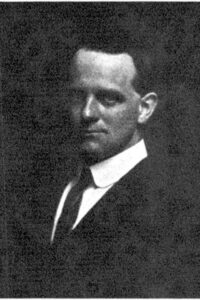
The Lighted Match
“When a feller an’ a gal wash their hands in the same basin at the same time, it’s a tolerable good sign they won’t get married this year.”
The oracle spoke through the bearded lips of a farmer perched on the top step of his cabin porch. The while he construed omens, a setter pup industriously gnawed at his boot heels.
The girl bent forward, her fingers spread in a tin basin, as the man at her elbow poured water slowly from a gourd dipper. Heaped, in disorder, against the cabin wall lay their red hunting coats, crops, and riding gauntlets.
The oracle tumbled the puppy down the steps and watched its return to the attack. Then, with something of melancholy retrospect in his pale eyes, he pursued his reflections. “Now there was Sissy Belmire an’ Bud Thomas, been keeping company for two years, then washed hands in common at the Christian Endeavor picnic an’—” He broke off to shake his head in sorrowing memory.
Holding his muddied digits over the water, the young man paused to consider the matter.
Suddenly, his hands went down into the basin with a splash.
“It is now the end of October,” he enlightened; “next year comes in nine weeks.”
The sun was dipping into a cloud bank already purpled and gold-rimmed. Shortly, it would drop behind the bristling summit line of the hills.
The girl looked down at tell-tale streaks of red clay on the skirt of her riding habit and shook her head. “‘Twill never, never do to go back like this,” she sighed. “They’ll know I’ve come a cropper and fancy I’m as breakable as Sévres. There will be no end of questions.”
The young man dropped to his knees and began industriously placing a brush on the damaged skirt. The farmer took his eyes from the puppy for an upward glance. His face was concerned.
“When I saw your horse fall, he tried to jam you to China. You sure lit hard!”
“It didn’t hurt me,” she laughed as she thrust her arms into the sleeves of her pink coat. “You see, we thought we knew the run better than the whips and chose the shortcut across your meadow. My horse took off too wide at that stone fence. That’s why he went down, and we turned your house into a port of repair. You have been very kind.”
The trio started down the grass-grown pathway to the gate where the hunters stood hitched. The young man dropped back a few paces to satisfy himself that she was not concealing some hurt. He knew her half-masculine contempt for acknowledging the fragility of her sex.
Reassurance came as he watched her walking ahead with the unconscious grace that belonged to her pliant litheness and expressed itself in her superb, almost boyish carriage.
When they had mounted, and he had reined his bay down to the side of her roan, he sat studying her through half-closed, satisfied eyes though he already knew her as the Moslem priest knows the Koran. While they rode in silence, he conned the inventory. Slim uprightness like the strength of a young poplar; eyes that played the whole colour-gamut between violet and slate-grey, as does the Mediterranean under the sun and cloud bank; lips that in repose hinted at melancholy and broke into magic with a smile. Then, there was the suggestion of a thought furrow between the brows and a chin delicately chiselled but resolute and fascinatingly uptilted.
It was a face that triumphed over mere prettiness, with hints of challenging qualities, individuality, possibilities of purpose, glints of merry humour and unspoken sadness, deep-sleeping potential for passion, and a hundred charming whimsicalities.
Her eyes were just now fixed on the burning beauty of the sunset, and the thought furrow was delicately accentuated. She drew a long, deep breath and, letting the reins drop, stretched out both arms toward the splendour of the skyline.
Read or download Book
Charles Neville Buck
Charles Neville Buck (April 15, 1879 – August 10, 1957) was an American writer who had many of his novels staged in theater productions and adapted into films during the silent film era. He was born in Woodford County, Kentucky. His father Charles William Buck served U.S. President Grover Cleveland’s administration in Peru and wrote Under the Sun about the Inca period. His maternal grandfather was dean of the University of Kentucky Medical School.
Buck was born near Midway, Kentucky, and grew up in Kentucky apart from four years living with his father in South America. Buck graduated from the University of Louisville in 1898. Many of his works were serialized such as Battle Cry in Munsey’s Magazine. The story was set in Kentucky’s Cumberland Mountains. Several of his novels include illustrations by various artists. His work includes yarns about the mountain men of Kentucky and their traditions. He worked for a year as a cartoonist and then for about a decade as a reporter in Kentucky. He moved to New York City after finding success as a writer. He married and acquired a vacation home in Orleans on Cape Cod, Massachusetts.
Buck also published under the pseudonym Hugh Lundsford.
Bibliography
- The Lighted Match (1910)
- The Key to Yesterday (1910)
- Portal of Dreams (1912)
- Call of the Cumberlands (1913)
- The Battle Cry (1914)
- The Code of the Mountains (1915)
- Destiny (1916)
- The Tyranny of Weakness (1917)
- When ‘Bear Cat’ Went Dry (1918)
- A Pagan of the Hills (1919)
- The Law of Hemlock Mountain (c. 1920)
- The Tempering (1920)
- The Roof Tree[9] (1921)
- The Tyranny of Eben Tollman (1923)
- A Gentleman in Pajamas (1924)
- Rogue’s Badge (1924)
- Portuguese Silver (1925)
- The Flight to the Hills (1926)
- Iron Will (1927)
- Hazard of the Hills (1932)
- The Strength of Samson






